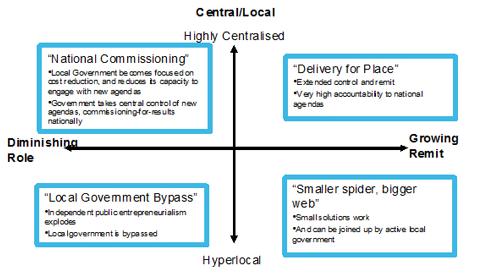Martin Stott
The Scottish referendum campaign is having an interesting knock-on impact on English political debate. The position and dominance of London – the place Scots most dislike about the United Kingdom in its present form – is being looked at more critically. There have been a couple of think tank reports recently, but the debate has moved quite a way beyond the narrow audiences that these reports usually attract. That in itself is a reflection of the way the ground is shifting.
First out of the blocks was the Centre for Cities’ ‘Cities Outlook 2014’ report. The document is mainly pretty dry, though jazzes up with unusual graphics and some different takes on the issues. Basically it is saying that London has become super dominant in the UK economy, so much so that four out of five private sector jobs are created in London and that every major city outside the South East is losing young people to London with one in three 22-30 year olds ending up there. Put another way, London accounted for ten times as many private sector jobs as any other city and also saw a growth in public sector jobs as well. By contrast Bradford, Sheffield, Bristol, Southampton, Blackpool and Glasgow all saw employment shrink in both the public and private sectors.
All this is very much backed up by word done for the Core Cities group (Birmingham, Bristol, Manchester, Leeds, Nottingham, Liverpool, Newcastle and Sheffield) who have initiated an Independent City Growth Commission chaired by Jim O’Neill, the Manchester born ex- Goldman Sachs Chief Executive. Their focus is on how to make Britain less focused on London in order to promote higher levels of national growth and create a less divided nation. Their plan is to issue a final report in the autumn in an attempt to set the agenda for the period leading up to the 2015 General Election. Essentially, the Core Cities interim report ‘metro growth: the UK’s economic opportunity’ argues that cities outside the South east need to be built into larger economic zones with better connections between them to create bigger markets and the kind of economies of scale for business that are to be found in London and the South East.
Meanwhile, the BBC’s Evan Davis has been busying himself on a very similar topic. His mini-series ‘Mind the gap: London vs the rest’ on BBC 2 looked at how London manages to earn more than one fifth of Britain’s income and continues to pull away in terms of growth and development while other regions still feel the sting of recession. Davis had some jolly japes in tall cranes and large diggers across London in search of the answers to his questions, but he knew that one very important answer was staring him in the face: public investment in intrastructure. Transport infrastructure investment is currently running at £5000 per person pa in London (think Cross Rail) and just £700 per person pa in the English regions.
Slightly perversely Davis took his viewers to visit the centre of his proposed new city-region-to-challenge-London: Hebden Bridge. But of course he had a point and it was that Hebden Bridge is in the centre of a huge potential city region stretching across England from Liverpool to Hull via Manchester and Leeds. Hebden Bridge is in the middle of this city region in the Pennines, rather winningly described by one of its residents as the city centre with an ‘inverted green belt’ – and places like Manchester and Leeds as its ‘suburbs’. This is far from outlandish. This part of the north of England really did challenge London for economic supremacy in the 19th century with its coal, steel and cotton as well as ports to export to the Empire.
But can it be revived as an economic counter-balance to London? That seems to depend on political will and a desire to invest in the area, especially its transport infrastructure. The Centre for Cities report makes a telling comparison. While acknowledging that the combined economies of Leeds and Manchester are just one fifth the size of London, it argues that they are unlikely to make the best of this combined scale because of ‘weak transport links’ citing ‘the distance between Leeds and Manchester is around 30% shorter than between Cambridge and London, yet the quickest train takes four minutes longer’. Jim O’Neill makes a similar point in an Observer interview about HS2, which he thinks will exacerbate the problem and simply make Birmingham a suburb of London, arguing that the money should be spent instead on creating a web of good links in the north: ‘In my judgement, for the national economy, that is way more important than improving the speed of the link from London to any of these places’.
Improving transport links in a new ‘super city’ is one dimension, but a couple of other factors are worthy of mention as well. London is the financial, political and cultural capital of the UK. This doesn’t give a lot of space for other cities to shine, unlike in say Germany with Frankfurt as its financial capital, Berlin as its political capital and Hamburg as its cultural capital. The same is true in Italy (Rome/Milan) and the USA, amongst others. Moving Whitehall and Westminster out of London would do them a power of good. If Scotland stays in the UK, the British Parliament could meet in London occasionally, but the four ‘nations’ would have Parliaments of their own in other cities.
More prosaically, the Centre for Cities report suggests that all the core cities should have access to the same policy powers as London has, i.e. strategic planning powers, powers over the budget for its transport system and police force, and a super-city wide elected assembly and directly elected mayor. A revival of regional identity and local government could yet come out of these debates, and not before time.
Martin Stott joined INLOGOV as an Associate in 2012 after a 25 year career in local government.


